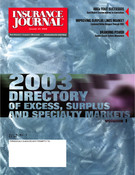Now that the Texas legislative session is underway and the pre-election rhetoric surrounding insurance reform in Texas has moderated, the stage is set for the legislature to make the tough decisions necessary to resolve the current insurance crisis.
Going into the session two things were certain:
• State insurance regulation will change.
• This legislative session will be known for what it does on insurance reform.
The questions that still loom large are how insurance regulation will change, and who will be affected? Will a competitive model for both rates and forms emerge, or will the change be to a more onerous prior approval system for everyone?
Lawmakers have the option of advancing reforms that will lead to long-term price stability, increased competition and greater consumer choice; or they can make insurance reform a perennial issue for consumers and state legislators.
By all accounts, the insurance regulatory system in Texas is broken and in need of repair. Consumers are justifiably angry about the steep increases in their homeowners insurance premiums and the shrinking number of companies willing to sell new policies. Legislators, responding to constituent demand have promised a wide range of insurance reforms. And a broad spectrum of businesses including realtors, insurers, bankers and builders also support changing the way policies and prices are regulated.
Everyone—consumers, public policy makers and the business community—wants the same results. We all want more affordable coverage and more types of insurance policies from which to choose. We all want more companies writing policies in the state. Finally, we all want a regulatory system that stimulates, rather than stifles, the competitive market and assures that insurance prices are fair.
The current regulatory system provides a clear example of what’s wrong and how rigid regulation of forms can limit consumer choices and lead to huge losses. It shows how fraud can enter the system and boost the severity of claims. And it exemplifies the negative role that the trial lawyers can play in the marketplace.
Any reform proposal must make improvements on the current environment. Consumers benefit from being able to select the policy that best fits their coverage needs and budget. Greater choice in policies and more competition among insurers translates to lower insurance premiums for consumers. That’s why we think it is important that any regulatory reform should also provide an incentive for more insurance companies to write policies in the state.
Of course, regulators play an important role in fostering a healthy and competitive insurance market. Consumers must have the confidence that the price they are paying for insurance is fair and that their insurance company will be able to pay all future claims. Regulators must have the authority to make sure that rates are adequate, not excessive, and not unfairly discriminatory. However, bureaucratic control of insurance prices or regulation that precludes companies from adapting to changes in the marketplace only serve to stifle competition, limit consumer choices, and drive up the cost of coverage.
The industry, to the maximum extent possible, has to work together and to that end the National Association of Independent Insurers (NAII) has tried to bring the various elements together. NAII is working with others in the industry to build and broaden coalitions with other stakeholders, such as realtors, builders, mortgage lenders and conservative advocacy groups. We’re working with state legislators, the governor’s staff and others to help them better understand the basic principles of how the insurance industry operates.
Legislators looking to fulfill their campaign promises are considering a plethora of “solutions” to the Texas homeowners insurance crisis. We hope that every proposal will be subject to the litmus test of whether or not these plans serve the best interests of consumers by driving down the underlying cost of insurance through choice, competition, and reasonable regulation.
Donald Hanson is the Southwestern Regional Manager for the National Association of Independent Insurers (NAII). Based in Austin, Texas, Hanson represents NAII in Oklahoma, New Mexico and Texas. NAII is the nation’s leading full service property/casualty insurance trade association with more than 715 member companies writing more than $98 billion in annual premium. NAII members write nearly 40 percent of the personal lines insurance in Texas.
Topics Texas Legislation
Was this article valuable?
Here are more articles you may enjoy.


 Florida Insurance Costs 14.5% Lower Than Without Reforms, Report Finds
Florida Insurance Costs 14.5% Lower Than Without Reforms, Report Finds  Trump’s Repeal of Climate Rule Opens a ‘New Front’ for Litigation
Trump’s Repeal of Climate Rule Opens a ‘New Front’ for Litigation  Pipeline Explodes at Delfin LNG Planned Project in Louisiana
Pipeline Explodes at Delfin LNG Planned Project in Louisiana  AIG Underwriting Income Up 48% in Q4 on North America Commercial
AIG Underwriting Income Up 48% in Q4 on North America Commercial 


